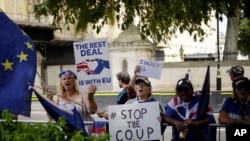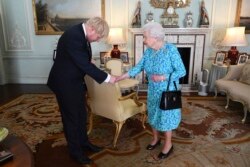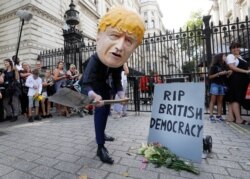British Prime Minister Boris Johnson was accused Wednesday of committing a “constitutional outrage” by asking the country’s monarch, Queen Elizabeth II, to suspend Parliament for a month, complicating attempts by opposition parties and rebel Conservative lawmakers to thwart his Brexit plans to break away from the European Union.
The queen approved the request after a delegation of ministers sat with her.
The hardball gambit, which adds yet another twist in a long-running Brexit saga that all along has risked fraying the country’s constitutional order, triggered outrage from pro-EU and opposition party leaders. They accused Johnson of mounting a “coup against Parliament” by seeking to curtail its power of oversight and debate.
The suspension of Parliament, known as prorogation, is normally a constitutional formality in which the legislature is suspended for a few days, generally every British autumn, ahead of the government setting out a fresh parliamentary agenda in a speech delivered by the monarch.
Prorogation is in the gift of the sovereign but is undertaken on the advice of the government.
In words not heard for centuries from a speaker of the House of Commons, John Bercow, the current occupant of the speaker's chair, mounted a furious attack on Johnson.
“Shutting down Parliament would be an offense against the democratic process and the rights of parliamentarians as the people’s elected representatives,” he said.
He added, “However it is dressed up, it is blindingly obvious that the purpose of prorogation now would be to stop Parliament debating Brexit and performing its duty in shaping a course for the country.”
‘Bring it on’
Suspending Parliament also drew demands from opposition party leaders, including Nicola Sturgeon, the first minister of Scotland, for Johnson to agree to a snap election rather than to seek to pull off Brexit by political subterfuge. Sturgeon likened the prorogation to an act of “dictatorship” and said “it is reasonable to describe the act as a coup d’état” by the executive branch.
She dared Johnson to call a general election instead, saying, “Bring it on.”
The furious pushback by pro-EU lawmakers marked yet another day of high drama for the Brexit-mired country, once noted for the steadiness and predictability of its politics but now seen as a state in the grip of political disorder.
The day began with a delegation of ministers descending on the queen, disturbing her annual vacation at her Scottish residence, Balmoral, to “advise” her to suspend Parliament for a month, with a new parliamentary session starting on Oct. 14, two weeks before Britain’s Brexit deadline.
The suspension will give less time for the polarized Parliament to block Britain from leaving the EU without an exit deal with Brussels, something Johnson has pledged to do if he cannot secure a new agreement able to pass the British legislature. And it will give little time for lawmakers to debate any new deal he is able to negotiate with EU leaders before the October 31 exit deadline.
Theresa May, Johnson’s predecessor, struck an exit deal with Brussels a year ago, but Parliament declined to endorse it, with both pro-EU and Brexit lawmakers opposed to it.
According to Dominic Grieve, a leading Conservative rebel and a former attorney general, the suspension will mean that lawmakers will have just seven days in practical terms in which to ensure they can block a no-deal Brexit.
He warned the move could backfire on Johnson and act as a unifying factor in securing a majority to pass next week a no-confidence motion in the government, bring it down and trigger an election, or pass legislation seeking to prevent a no-deal Brexit.
Johnson leads a minority Conservative government whose one-seat majority relies on a Northern Ireland party. But there is a majority in Parliament against a so-called no-deal Brexit.
Philip Hammond, the former chancellor of the exchequer in May's government, tweeted: “It would be a constitutional outrage if Parliament were prevented from holding the government to account at a time of national crisis. Profoundly undemocratic.”
Prorogation is rare
Aside from the practical politics, the prorogation Johnson has successfully secured from the queen is highly unusual. Only four times in history — in 1628, 1831, 1948 and 1997 — has either a monarch or the government engineered a prorogation to hinder Parliament from debate.
The prorogation in 1628 by Charles I lit the fuse for the English Civil War. The 1831 prorogation delayed a major reform act, and the 1948 suspension assisted Clement Attlee's Labor government in nationalizing key British industries. In 1997, then-Prime Minister John Major used prorogation to stop a cash-for-questions scandal.
As lawmakers from all parties reacted with outrage at the prorogation, the leader of Britain’s main opposition Labor Party, Jeremy Corbyn, added to the high drama by writing to the queen, warning her that granting the suspension was “against the wishes of a majority of the House of Commons.” Corbyn was accused of dragging the monarch into the Brexit dispute, something Johnson's foes are accusing him of doing.
Corbyn demanded to see the queen before agreeing to Johnson’s request, but his letter arrived too late.
Johnson’s supporters rallied to his defense, arguing that if he’d really wanted to shut out Parliament, he would have asked for a longer suspension right up to the day after the deadline. They said Parliament has had plenty of time to debate Brexit.
“Despite all the shock indignation about Parliament being prorogued there is nothing it can’t do next week or after 14th October that it could have done during the four weeks it won’t be sitting. One thing Brexit hasn’t lacked is time for open ended parliamentary debate,” tweeted Damian Collins, a pro-Brexit Conservative lawmaker.







